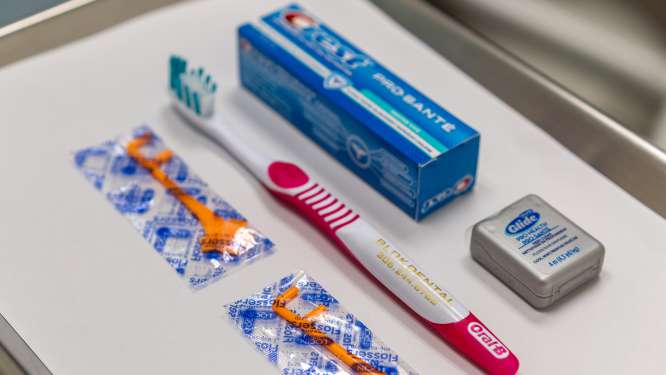
Brushing and flossing your teeth might seem elementary, but it turns out that many Canadians are doing it improperly! With reduced access to professional dental care during the covid-19 pandemic, investing energy into your oral home care routine is more important now than ever before. The dental care team and BLOK Dental Studio is here to empower you to amp up your home care routines until we can see you again for your regular dental exam and cleaning. Keep reading to learn how to avoid the eight most common dental care mistakes!
8 Common Oral Home Care Mistakes:
- Using the wrong tools
- Brushing too hard
- Not brushing often enough or forgetting to brush
- Brushing at the wrong times
- Cutting corners or missing spots, especially the back teeth
- Rushing, or not brushing for long enough time
- Skipping flossing
- Skipping tongue cleaning
8 Tips For Better Oral Health at Home
As dentists, it’s our job to remind you to brush and floss daily, but even if you’re doing it daily, you’re still going to end up with dental health issues if you’re not doing it correctly. To ensure you are getting the full benefits of your brushing and flossing efforts, follow our tips to avoid the eight most common oral home care mistakes:
Use the right tools.
Choose a toothbrush with soft bristles, and replace it every 3-4 months. If you have dexterity challenges caused by carpal tunnel syndrome, arthritis, Parkinson’s disease, cerebral palsy, etc., opt for an electric toothbrush and a water flosser instead of the manual tools.
Flosser pics are great for quick jobs on the go but should not be used as a substitute for actual dental floss as they don’t have the same flexibility, which is needed to curve around the sides of each tooth.
If you’re still unsure what oral care products to use, talk to your dentist or consult this guide on CDA-approved oral care products.
Brush gently.
Because plaque is soft, it isn’t difficult to remove if you are doing it regularly. Don’t brush too hard—applying too much pressure while brushing can damage your enamel and gums.
Brush twice daily.
With changes to your daily routine brought on by the shift towards working or studying from home during the pandemic, it can be easy to forget to brush your teeth! Getting dressed may not be essential anymore if you’re staying home, but brushing your teeth still is! If you’re forgetful, you’re not the only one—remember, it takes 21 days of successive repetition to form a new habit! Reliable reminders and repetition are key:
- establish a new morning routine at home, just as you would if you were leaving the house each day.
- Set an alarm on your phone or leave a sticky note on your bathroom mirror to help you remember to brush.
- Synchronize your oral care with your medication times or anything else that occurs regularly every day, no matter where you are.
Wait 1 hour before brushing after you eat.
Avoid brushing immediately after snacks or meals when your enamel is softened from exposure to sugars and acids in your food or drink. To keep your enamel healthy and intact, wait to brush your teeth 30-60 minutes after eating or drinking anything sugary or acidic—including coffee!
Practice good technique and don’t cut corners.
The best practice for tooth brushing is to position the bristles at a 45-degree angle against the teeth along the gumline. Gently wiggle the toothbrush in a circular motion where the teeth meet the gums and back and forth over the surfaces of your teeth. Brush all sides of each tooth, including the insides (tongue side), outsides (cheek side), and tops of the molars. For more detailed instructions on proper brushing, follow the Canadian Dental Association’s guide to thorough brushing.
Take your time.
When you brush, don’t rush! Spend a few seconds brushing each tooth, one by one. Brushing should take you at least two minutes. Set a timer or sing through the lyrics to your favourite song to ensure that you’re bruising for long enough. If you’re a multitasker with a habit of brushing your teeth while doing other things such as watching tv, texting, checking the weather, or tidying up, stop for two minutes and focus on what you are doing! You could waste 3-4 minutes doing an improper job while trying to do other things simultaneously or spend just 2 minutes doing it correctly.
Remember to floss at least once daily.
Did you know that up to 35% of your teeth’ surfaces get missed by a toothbrush? Flossing, or using a water flosser, is the only way to clean the hard-to-reach places that a toothbrush can’t reach. Flossing at least once per day will prevent plaque and tartar buildup that leads to gingivitis, gum disease, and tooth decay.
The best way to floss your teeth is to curve the floss into a C-shape around each tooth and just under the gumline. Gently move the floss up and down to clean the sides of each tooth. Make it into a daily habit by leaving dental floss around the house or in places you’ll see it throughout your day, and use some whenever you have the time or inclination to reach for it.
Clean your tongue every time you brush.
Even if you brush and floss thoroughly, a mucus-like coating of bacteria builds up on the tongue and should be removed daily. You can brush your tongue from back to front with your toothbrush (make sure to rinse your toothbrush clean afterward), or you can use a tongue scraper.
Develop Thorough Dental Care Habits For Lifelong Benefits!
The better your oral home care habits are, the less likely you are to develop dental issues that require intervention from your dentist during a time when professional dental care is less accessible. The benefits of developing thorough home care habits will never fade away, even after covid-19. Reduce the risk of needing costly treatments to remedy problems that thorough dental care routines can prevent! As always, the team at Blok is here to support you and keep you smiling brightly for life!
